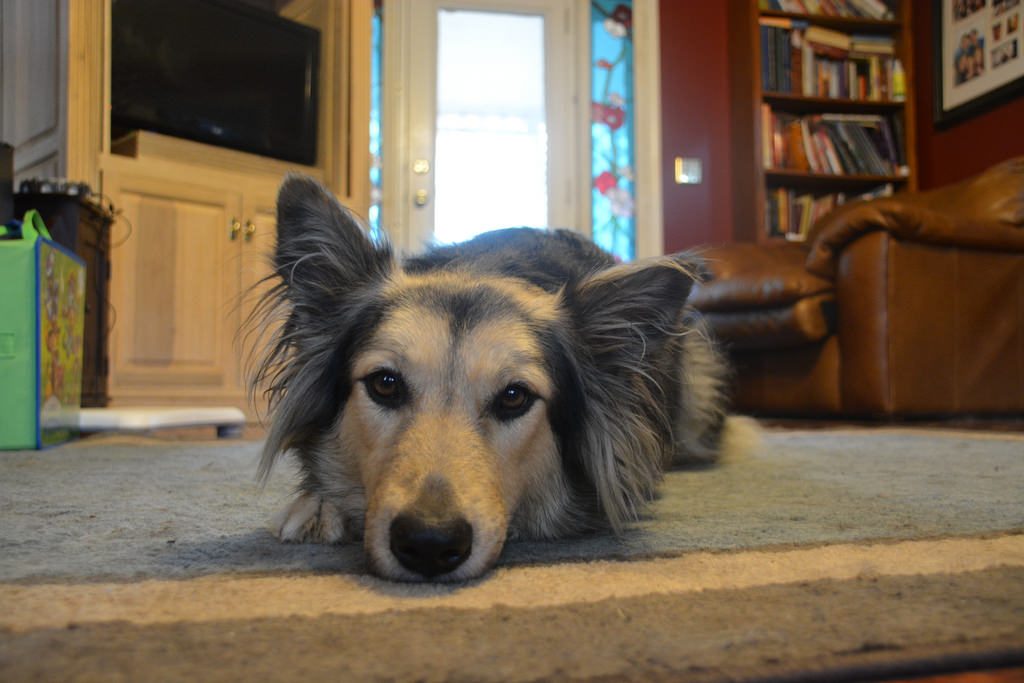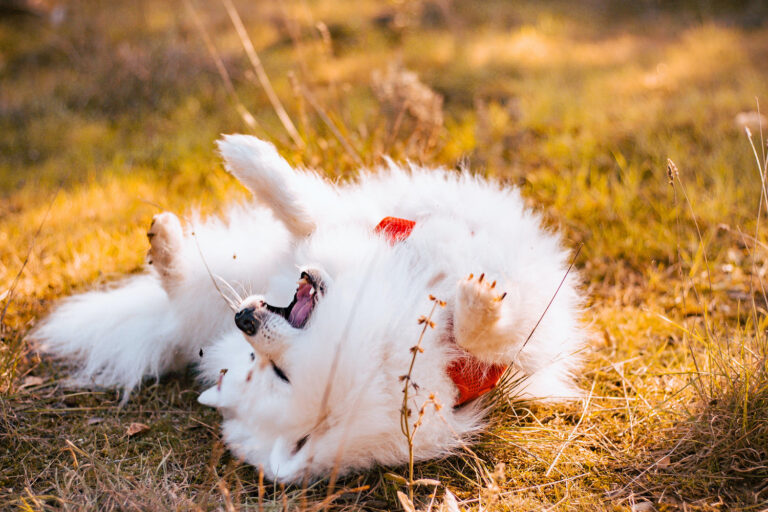To teach a dog to roll over, start by having them lie down and then slowly move a treat from their nose to the side of their head and towards their shoulder, encouraging them to lie on their side. Praise and reward them each time they follow the treat and lie flat on their side.
Practice this step before moving on to the next.

Credit: ultimatepetnutrition.com
Step 1: Basic Commands And Behavior
To teach a dog to roll over, start by having them lie down. Then, slowly move a treat from their nose to the side of their head and towards their shoulder. Continue moving the treat so they roll onto their other side.
Repeat and reward each time they follow the treat and lie flat on their side with their head on the floor.
Teaching The Dog To Lay Down
To teach your dog to roll over, the first step is to establish a strong foundation of basic commands and behavior. This begins with teaching your dog to lay down, which is an essential command for many different tricks and behaviors.To teach your dog to lay down, follow these steps:- Start by holding a treat in front of your dog’s nose.
- Slowly move the treat down towards the ground.
- As your dog follows the treat, their body will naturally lower towards the ground.
- Once your dog’s body is fully on the ground, praise and reward them with the treat.
Establishing Positive Reinforcement
Positive reinforcement is a crucial aspect of teaching your dog any new trick, including rolling over. It involves rewarding your dog for displaying the desired behavior, thereby encouraging them to repeat it in the future.To establish positive reinforcement while teaching your dog to roll over, follow these guidelines:- Use treats as rewards: Whenever your dog successfully performs a step towards rolling over, give them a treat immediately.
- Praise and affection: In addition to treats, use verbal praise and affectionate gestures like petting and belly rubs to reinforce the desired behavior.
- Consistency is key: Be consistent with your rewards and praise, ensuring your dog understands exactly why they are being rewarded.
- Timing is crucial: Offer rewards promptly after your dog performs the desired action to reinforce the connection between the behavior and the reward.
Credit: www.insider.com
Step 2: Rolling Motion
Teaching a dog to roll over involves asking them to lie down and then slowly moving a treat from their nose to the side of their head and towards their shoulder. This helps encourage them to follow the treat and lie flat on their side with their head on the floor.
Moving Treat From Nose To Shoulder
To teach your dog to roll over, you need to create a rolling motion. Start by holding a treat in your hand and guiding your dog’s attention towards it. Place the treat close to their nose and slowly move it towards their shoulder. Make sure to keep the treat low and close to their body, encouraging them to follow it with their head and eyes. This motion will help your dog understand the direction in which they need to roll. Remember to use positive reinforcement such as praise and treats when they follow the treat from their nose to the shoulder.Encouraging The Dog To Roll Onto Its Side
Once your dog is comfortable moving their head and eyes towards their shoulder, you can proceed to the next step of encouraging them to roll onto their side. With the treat still in hand, gently guide your dog’s head to the side while applying slight pressure to their shoulder. This will help them shift their weight and start to roll onto their side. It’s important to go slow and be patient during this step, as some dogs may take longer to feel comfortable with the rolling motion. Continue to use positive reinforcement, praising and treating your dog when they successfully roll onto their side.Ensuring Each Heading Adheres To Html Syntax
Moving Treat From Nose To Shoulder
Encouraging The Dog To Roll Onto Its Side
Step 3: Verbal Cues And Refinement
To teach a dog to roll over, start by having them lie down and placing a treat near their nose. Slowly move the treat to the side of their head, then towards their shoulder to encourage them to roll onto their side.
Add a verbal cue, such as “roll over”, to reinforce the behavior.
Once your dog has mastered the basic roll over motion, it’s time to add verbal cues and hand signals to the equation. This step will help your dog understand and respond to specific commands, making their roll over trick more refined and impressive.Adding Verbal Cues And Hand Signals
To add verbal cues and hand signals, follow these steps:- Choose a verbal cue such as “roll over” or “flip.”
- Simultaneously with the physical motion, of your hand, say the chosen verbal cue. For example, as you guide your dog’s motion with a treat, say “roll over” at the same time.
- Repeat this process several times, reinforcing the verbal cue with the physical motion each time.
- Avoid using too many words or phrases as it might confuse your dog. Stick to one clear verbal cue.
- Once your dog starts associating the verbal cue with the roll over motion, gradually reduce the physical motion by relying more on the verbal cue and hand signal.
Repeating And Reinforcing The Roll Over Motion
To refine your dog’s roll over trick further, continue repeating and reinforcing the motion in different environments and situations. This will help your dog generalize the command and perform the trick consistently.- Practice the roll over command in various locations – indoors, outdoors, on different surfaces, and with distractions present.
- Praise and reward your dog each time they successfully execute the roll over motion.
- Be patient and consistent with your training sessions, keeping them short and frequent for better retention.
- Continue reinforcing the verbal cue and hand signal, occasionally reintroducing the treat as a reward to maintain motivation.
- Slowly fade out the treat rewards over time, relying solely on praise, petting, and other forms of positive reinforcement.

Credit: www.rover.com
Common Challenges And Troubleshooting
Teaching a dog to roll over can be a fun and rewarding experience for both you and your furry friend. However, like any training exercise, there are bound to be some challenges along the way. In this section, we will address some common problems that may occur during the training process and provide tips on how to troubleshoot them.
Problems That May Occur During Training
While teaching your dog to roll over, you may encounter the following issues:
| Problem | Solution |
|---|---|
| Your dog refuses to lie down | Try using some enticing treats to encourage your dog to lie down. You can also try using a clicker or a verbal cue to associate the command with the desired behavior. |
| Your dog struggles to follow the treat | Make sure you are using a high-value treat that your dog finds irresistible. You can also break the training sessions into shorter, more manageable segments, gradually increasing the difficulty as your dog becomes more comfortable. |
| Your dog gets confused or loses interest | Keep the training sessions short and engaging. Use positive reinforcement techniques such as praise and rewards to motivate your dog. Remember to be patient and consistent in your approach. |
Common Mistakes And How To Avoid Them
When teaching your dog to roll over, it’s important to be aware of some common mistakes that can hinder their progress. Here are a few mistakes to avoid:
- Rushing the training process: It’s important to take things at your dog’s pace. Pushing them too quickly can lead to frustration and resistance. Take small steps and gradually build up to the full roll-over motion.
- Using force or punishment: Training should always be a positive and enjoyable experience for your dog. Avoid using any forceful or punishing techniques, as this can create fear and hinder the learning process.
- Inconsistency: Consistency is key when it comes to training. Make sure to use the same verbal cues and hand signals each time, and stick to a set training routine. This will help your dog understand what is expected of them.
By being aware of these common mistakes and taking steps to avoid them, you can set your dog up for success and ensure a smooth training journey.
Remember, teaching a dog to roll over requires patience, consistency, and a positive attitude. Don’t be discouraged by setbacks or challenges along the way. With time and dedication, you and your dog can master this impressive trick!
Frequently Asked Questions On How Do You Teach A Dog To Roll Over
What Is The Easiest Way To Teach A Dog To Roll Over?
To teach a dog to roll over, start by having them lie down. Then, move a treat from their nose to the side of their head and towards their shoulder, encouraging them to lie on their side. Praise and reward them each time they follow the treat and lie flat on their side with their head on the floor.
Practice this multiple times before moving on.
What Is The Hardest Trick To Teach Your Dog?
The hardest trick to teach your dog is “roll over. ” Start by having your dog lie down and slowly move a treat from their nose to the side of their head. Encourage them to lie on their side and reward them when they do.
Practice this consistently before moving forward.
What Age Can You Teach A Dog To Roll Over?
Roll Over can be taught to dogs of any age. Start by having your dog lie down, then guide them to roll onto their side using a treat. Repeat and reward each time they successfully follow the treat. Practice this before moving on.
Why Do Some Dogs Not Roll Over?
Some dogs may not roll over because it could be uncomfortable for them based on their body shape. For example, deep-chested dogs might struggle with this trick. If your dog refuses to roll over, you can try teaching them a different trick or stick to something like “play dead” instead.
Conclusion
To teach a dog to roll over, start by asking them to lie down and placing a treat near their nose. Slowly move the treat to the side of their head and towards their shoulder, encouraging them to lie on their side.
Praise and reward them each time they follow the treat and lie flat on their side. Consistent practice will help them master this fun trick. Enjoy the process of teaching your furry friend this impressive skill!



